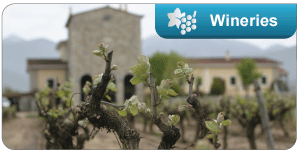PDO wines of Greece
PDO Wines of Greece (“Protected Designation of Origin”) include the Greek wine category of “Designation of Origin Wines” (AOQS and AOC).
The areas where AOQS wines are produced – “Designation of Origin of Superior Quality” (part of the PDO Wines of Greece) are in essence the historical winegrowing and winemaking areas of Greece. In those areas, winegrowing zones determined on the basis of the borders of communal municipalities have been established, together with certain restrictions regarding altitudes or natural and artificial limits. With the exception of two areas, varietal compositions are determined strictly on the basis of Greek native grape varieties. All zones are subject to restrictions as to the maximum allowable yields per 0.1 hectare and various other prerequisites which wines must comply with. Especially AOQS wines, which carry a mandatory characteristic red band on the neck of their bottles, must be produced by wineries located within their winegrowing zone. In other words, it is not only the grapes which must originate within a certain zone: the wineries vinifying them must be established within that zone as well.
The AOC wines zones – “Controlled Appellation of Origin” (part of the PDO Wines of Greece) are historically and geographically determined winegrowing areas. AOC wines, which must be vinified by wineries located within their zones, carry a mandatory characteristic blue band on the neck of their bottles, must meet all the prerequisites of AOQS wines and, additionally, have higher specifications as to their content in sugars. They are exclusively sweet wines which are produced in the following two ways:
• By addition of alcohol originating in wine (previously fortified wines – currently liqueur wines). Such wines are characterized as "vin doux naturel". The use of alcohol in their vinifications gives them the designation of “controlled” wines.
• By concentration of the grape contents through various natural techniques (over-maturation on the vine stock; exposure to the sun (sun-dried grapes); sun-drying; or air-drying following the harvest). These wines bear the characterization of “vin naturellement doux”. Should the grapes yielding these wines have been sun-dried prior to vinification, the wines are also entitled to being characterized as “straw wines" or "vin liastos”. No additional sweetening is allowed through the addition of must, concentrated or not, or through the addition of alcohol or any distillate.
PDO Wines of Greece (AOQS and AOC) are required to display certain indications and other information on their labels. These concern aging times (oxidized aging in oak barrels and fermentation in bottles) as well as details of the winegrowing entity producing them.
In the popular zones of PDO Wines of Greece (AOQS and AOC) provisions allow aging in oak barrels (with the exception of the PDO Santorini and PDO Monemvassia-Malvasia zones); bottling (except PDO Monemvassia-Malvasia) and bottle fermentation also in wineries located outside the zones. Thus, PDO Wines of Greece (AOQS and AOC) are also produced by wineries outside the zones that collaborate with wineries within them.
The PDO Wines of Greece are: PDO Anchialos; PDO Amynteo; PDO Archanes; PDO Goumenissa; PDO Dafnes; PDO Zitsa; PDO Lemnos; PDO Mantinia; PDO Mavrodaphne of Cephalonia; PDO Mavrodaphne of Patras; PDO Messenikola; PDO Monemvassia-Malvasia; PDO Muscat of Cephalonia; PDO Muscat of Lemnos; PDO Muscat of Patras; PDO Muscat of Rio Patras; PDO Muscat of Rhodes; PDO Naoussa; PDO Nemea ; PDO Paros ; PDO Patras; PDO Peza; PDO Slopes of Meliton; PDO Rapsani; PDO Rhodes; PDO Robola of Cephalonia; PDO Samos; PDO Santorini; and PDO Sitia.


